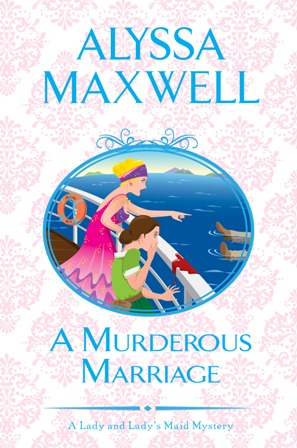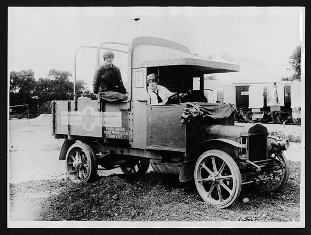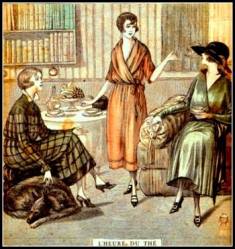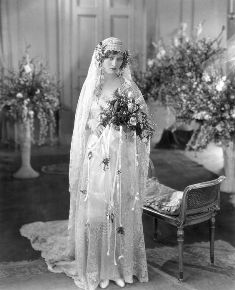 When our lovely hostess, Dru Ann, asked me about my typical day, I sat down with a cup of tea and gave the matter some serious thought. “Typical” is a term that has lost much of its meaning in recent years—since the Great War swept through Europe. My life thus far has passed in three distinct phases: Before the War, During the War, and After the War.
When our lovely hostess, Dru Ann, asked me about my typical day, I sat down with a cup of tea and gave the matter some serious thought. “Typical” is a term that has lost much of its meaning in recent years—since the Great War swept through Europe. My life thus far has passed in three distinct phases: Before the War, During the War, and After the War.
 Before the war, I was still quite young and not “out” in society as they say, but even so I recognized a rhythm to life that involved guests regularly coming and going from our country estate; seasons spent in London; shopping the last fashions in Paris each spring; autumn hunting parties (I was an especially good rider as a child; now however, the horses are long gone, having been sent to serve in the early years of the war); balls, soirees, charitable events . . . well, you get the idea. In short, life for my family was one of enjoyment, tradition, and yes, indulgence. In our defense, we did employ a good many people and oversaw the wellbeing of many more still.
Before the war, I was still quite young and not “out” in society as they say, but even so I recognized a rhythm to life that involved guests regularly coming and going from our country estate; seasons spent in London; shopping the last fashions in Paris each spring; autumn hunting parties (I was an especially good rider as a child; now however, the horses are long gone, having been sent to serve in the early years of the war); balls, soirees, charitable events . . . well, you get the idea. In short, life for my family was one of enjoyment, tradition, and yes, indulgence. In our defense, we did employ a good many people and oversaw the wellbeing of many more still.
Then the war happened. A typical day for me during those years involved organizing medical supplies, rolling bandages and making splints, gathering blankets and the like to be shipped to our soldiers on the Continent. I learned to drive the lorries and helped transport those supplies to the train depot. Often working side by side with our servants and women from the village (most of the men had all gone to fight) I felt useful, a vital part of the war effort. My activities mattered. I mattered.
 And then, on the eleventh hour of the eleventh day of the eleventh month, 1918, the war came to its conclusion. A joyful day, yes, but suddenly those of my class were left to wonder how we could ever go back to the way life had been in the before times. So much changed. The old notions of boundaries and birthright have become blurred. No longer content to farm or enter service, country people are moving to the cities, bettering themselves, and improving their lives. With enough courage and determination, even women can build a life beyond home and children—and in many cases, they must, for nowadays there aren’t enough men left to go around.
And then, on the eleventh hour of the eleventh day of the eleventh month, 1918, the war came to its conclusion. A joyful day, yes, but suddenly those of my class were left to wonder how we could ever go back to the way life had been in the before times. So much changed. The old notions of boundaries and birthright have become blurred. No longer content to farm or enter service, country people are moving to the cities, bettering themselves, and improving their lives. With enough courage and determination, even women can build a life beyond home and children—and in many cases, they must, for nowadays there aren’t enough men left to go around.
As to how I currently spend the days . . .
I’m still collecting supplies, now for injured veterans of the Great War and their families. I am involved in the running of the nearby Haverleigh School for Young Ladies. And, upon occasion, my lady’s maid, Eva, and I assist local law enforcement in tracking down malicious individuals’ intent on disturbing the peace of our lovely Cotswolds village, Little Barlow.
On the surface, it might not appear as though my life is so very different. We’re by no means poor, but extravagances are by necessity fewer than they used to be. And the future of Foxwood Hall—the house, gardens, forests, and tenant farms—which had once seemed a predetermined certainty, now hangs in the balance. Will my young brother be able to hang onto it once he inherits? That depends on his willingness to find inventive ways to put the estate to work. He, however, feels it depends on my sisters and me marrying men with enough money and inclination to extend hefty loans whenever necessary.
 And this, dear readers, leads me to the present day—a chilly day in April, 1920—in West Cowes on the Isle of Wight. In a few short hours, my eldest sister Julia will marry Gilbert Townsend, Viscount Annondale—a man with enough fortune at his disposal to save Foxwood Hall several times over.
And this, dear readers, leads me to the present day—a chilly day in April, 1920—in West Cowes on the Isle of Wight. In a few short hours, my eldest sister Julia will marry Gilbert Townsend, Viscount Annondale—a man with enough fortune at his disposal to save Foxwood Hall several times over.
 Does she love him? She does not. He’s decades older than she, still pines for his first wife, and hobbles with the use of a prosthetic leg and a cane. This last, of course, would be entirely beside the point were it not for his often surly and arrogant disposition and his tendency to treat my sister as though she were but one more trophy gracing the wall of his study. But Julia claims she is content. She is doing her duty to the family and will not be dissuaded. And believe me, I have tried.
Does she love him? She does not. He’s decades older than she, still pines for his first wife, and hobbles with the use of a prosthetic leg and a cane. This last, of course, would be entirely beside the point were it not for his often surly and arrogant disposition and his tendency to treat my sister as though she were but one more trophy gracing the wall of his study. But Julia claims she is content. She is doing her duty to the family and will not be dissuaded. And believe me, I have tried.
And what of me? Will I be the next Renshaw sister to march down the aisle to the beat of tradition’s drum to fill the family’s coffers and maintain the style to which we have become accustomed? What do you think? How well do you know me? And what would you do in my place?
Giveaway: Comment below for a chance to win a copy of A Murderous Marriage in a random drawing. U.S. entries only, please. The giveaway ends January 30, 2019. Good luck everyone!
You can read more about Phoebe in A Murderous Marriage, the fourth book in the “Lady and Lady’s Maid” historical mystery series, coming January 29, 2019.
Lady Phoebe Renshaw and her lady’s maid, Eva Huntford, are preparing for a wedding, but it may not be the happy occasion everyone hopes for . . .
Since the Great War, some family fortunes have suffered, including those of the Renshaws. Despite being the granddaughter of an earl, Julia Renshaw is under pressure to marry for money—and has settled for Gilbert Townsend, a viscount and a wealthy industrialist. He is decades older than Julia, and it’s clear to her sister Phoebe—and to Eva, who has been like a surrogate mother to the girls—that this is not a love match. Nevertheless, the wedding takes place—and in a hurry.
At the reception aboard the groom’s yacht, there appears to be tension between Gil and several guests: his best man, a fellow veteran of the Boer War; his grouchy spinster sister; and his current heir, a nervous young cousin named Ernest. The bride is also less than pleased when she discovers that her honeymoon will be more crowded than expected—with Gil’s pretty secretary, among others, coming along.
That very night, Julia pounds on her sister’s door, brandishing a bandaged hand and reporting a hot-tempered outburst on her new husband’s part. Julia is feeling doubt and regret about her hasty decision, but returns to the boat. Then the next morning, before the yacht can depart the harbor, Gil’s body is found in the water below—and Phoebe and Eva must discover who pushed him over . . . before the Renshaws’ social standing is irreparably stained by Julia’s arrest for his murder . . .
Purchase Link
# # # # # # # # # # #
About the author
Alyssa Maxwell knew from an early age that she wanted to be a novelist. Growing up in New England and traveling to Great Britain fueled a passion for history, while a love of puzzles drew her to the mystery genre. She lives in South Florida in the current year, but confesses to spending most of her time in the Victorian and post WWI eras. In addition to fantasizing about wearing Worth gowns while strolling her manor house gardens, she loves to watch BBC and other period productions and sip tea in the afternoons. You can learn more about Alyssa and her books at alyssamaxwell.com, and friend her on Facebook at her Gilded Newport Mysteries page and her author page.
All comments are welcomed.

I love love love Alyssa Maxwells Gilded Newport Mystery series. I think I’m going to love love love this one. Too!
Thank you, Jayne, that’s so sweet of you! I do think you’d enjoy Phoebe’s and Eva’s adventures!
Phoebe’s life sounds fascinating, and it was interesting how she talked about it before the Great War, during and after. I think her brother needs to man up and come up with a good plan to save their Estate instead of depending on his sisters making good marriages to rich men who will loan him money. This was a great post. Thanks, Dru Ann and Alyssa ~
Celia, you’re so right about Fox. And in this book I do give him a chance to redeem himself. Will he step up…? 😊
Great post! I’d be thrilled to win a copy.
Good luck, Jaime!
This intriguing series sounds fascinating with a flavor of Downton Abbey!
That was my intention, Cheryl! I suppose I couldn’t let it go when the show ended, so I took it up, but with a mystery twist.
That was definitely my intention, Cheryl. Downton Abbey, or Upstairs Downstairs, but with a mystery twist.
This series is on my WishList…
Thank you for the giveaway…
You’re welcom, Cyn!
I really enjoy books that include historical fiction in them. This series by Alyssa Maxwell and would love to be able to claim her latest book as my own. Thanks for featuring Alyssa and her book on your blog.
Thanks for stopping by and commenting, Robin!
Captivating and wonderful story which I would enjoy. The era and the characters and setting are fascinating.
Thanks, Laini! Good luck in the drawing!
I love reading books set in this time period. This one sounds really good.
It’s a fascinating time!
Would love to read this book. Love the time period.
Good luck, Lois!
This sounds delightful!
What a grim situation! No one was unaffected by the Great War and picking up the pieces of your life afterwards was a challenge for everyone.
Those were difficult times, and as they tried to pick up the pieces, they had no idea another terribly war was coming.
Alyssa, this is exactly the story I love to read! Thanks for introducing me to Phoebe. Now I must find out what happens to her.
You’re very welcome, Connie! Thanks for your interest!
I loved Downton Abbey, so I know I’ll love this–sounds like quite a transformation for the heroine, from pampered girl to girl on a mission.
She’s a bit like Edith, a middle sister who wants more than just to marry and have a family. Although she wants that too, eventually!
Ah, Phoebe, what a difficult situation. Though I could not advise on what to do, you said yourself that women with enough courage and determination could build a life beyond home and children. I believe you are such a woman.
You can bet on Phoebe being a young woman who determined to live on her own terms! 🙂
I’ve been reading a lot of fiction books about the First World War and its aftermath recently. Phoebe and her siblings are in such an interesting position—how do you carry on with your life when it’s changed so much because of the war, but still hold on to the remnants of what you were and what you were born to? I know this will be a great addition to the series. I’m anxious to read it!
Yes! And Phoebe would be able to give it all up and move on, if it weren’t for her grandparents, who are a bit lost in the more modern world. She sees how vulnerable they are and feels an obligation to help them hold on to what traditions they can.
I really enjoyed reading about Phoebe and about life before, during and after WWI. Sounds like Phoebe has a difficult decision to make.
Thanks, Dianne! Phoebe has many difficult decisions to make!
Looking forward to catching up with Lady Phoebe and Eva in the newest A Lady and Lady’s Maid Mysteries.
Thanks, Mary! Good luck in the drawing!
Sound like a great read.
Hi Doward! Thanks! It was a fun story to write.
This is a new to me series and sounds very intriguing.I would love to get to know Phoebe better. Thanks for the chance!
You’re welcome, Autumn! (Such a pretty name) Good luck in the drawing!
I love this series as well as Alyssa’s other series. She brings us into the lives of her characters so we can really understand what they were dealing with and how we might react in the situation. The constraints on the women make me thankful for my rights as a woman today!
I’m grateful for everything they did to make our lives more fulfilling!
I am on page 117 of Devious Death and see a late night finishing the book in my future. So glad I don’t have to wait too long for the next adventure. Alyssa, I love your books–both series–thanks so much for these stories.
Thank YOU so much, Shelley! Enjoy A Devious Death!
This is a fascinating time period. I’m curious to see how Phoebe & Eva solve the case.
They really have to rely on each other in this one!
I would love to win this. Thanks for the chance!
I enjoyed Alyssa Maxwell’s Gilded Newport Mystery series, and I’m very much looking forward to this newest book and its story of a world and time gone by.
I don’t know much about this period of time but would like to do so. Reading this would be a start.
Looks really great 👍 Thanks for Sharing this book with us 😍 📖
I’m Very Interested in the time period
Shared on Twitter 😍❤😍
https://mobile.twitter.com/LindaMoffitt02/status/1089416713832144896
I love these Historical Mysteries. Sounds wonderful as usual…thank you for the chance.
Marilyn ewatvess@yahoo.com
I have read books by this author. Her Newport Gilded Mystery books. I would like to try this other series of hers. Love historical mysteries. This book is set in a time period that I love to read about.
I can’t wait to red this one! I am going to be recuperating from surgery after Wednesday…will try and read then!
I love both of Alyssa Maxwell’s series and can’t wait to read about Julia and Gil’s wedding. Thanks for the chance to win a copy of Phoebe’s latest adventure.
**** WINNER ****
A Murderous Marriage is Linda Alkire
Congratulations!